
I watched Caught on a Train again the other night. It is a work that completed transfixed me when I first saw it, back in 1980, and which I have watched many times since. Made on location, it tells of the train journey across Europe (from Ostend to Linz) taken by Peter, a young, uptight English publishing executive (Michael Kitchen) and a grand elderly Austrian lady, Frau Messner, used to giving orders (Peggy Ashcroft). In their journey on a grubby, crowded night train we learn much about a receding old world and new one thrusting forward. She is rude and demanding, with a seeming blindness to the evils of the Nazi era to which she may have been witness. He is exasperated by her, but in his irritation and impatience we see someone lacking in grace, and ultimately in direction. As she tells him, at the work’s conclusion:
You’re a nice boy in many ways … You’re not really cruel. But you don’t care, do you? You may think you do, but you don’t really care, about anything. Except success in your work, that’s all you have. You don’t feel anything else, do you? I wonder what will happen to you.
It is a work entirely harmonious in its construction, where every counterpointing word and image falls true, and where Mike Westbrook‘s jazz score, by turns melancholy and vibrant, perfectly complements the unsettling tone.
I’m calling Caught on a Train ‘a work’, because the moment that you admit that it is a television programme, different rules apply. It was originally broadcast on BBC One on 31 October 1980, in the Playhouse slot, though many commentators have remarked upon its cinematic qualities, some saying that they see it as being as much a film as TV.
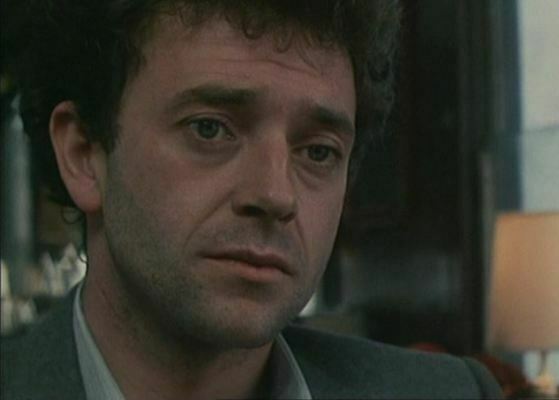
But read the DVD blurb, or watch the featurette that comes with it, and you’ll see that this is television, because the writer is everywhere and the director is nowhere. Caught on a Train is a Stephen Poliakoff ‘play’, and it is Poliakoff who speaks throughout the featurette, and whose work it is recognised to be. Of course this is true – Caught on Train was his conception, based on his own experiences, he wrote the words, and has becomes an auteur among programme makers, to the extent of frequently directing his own scripts (Close My Eyes, Shooting the Past, The Lost Prince, Joe’s Palace etc.)
Yet Caught on the Train had a director, and I was watching it again because Peter Duffell, the man in question, died on December 12th, aged 95. He was a director of astute style, much of whose work seems to be marked with a quiet, wry observation. His films included the portmanteau horror film The House That Dripped Blood (1971), the underrated Graham Greene adaptation England Made Me (1973) (which Greene so admired that he wanted Duffell to film The Honorary Consul – which sadly did not happen) and the charming Experience Preferred But Not Essential (1982, originally made for Channel 4 but shown theatrically in the USA and elsewhere).
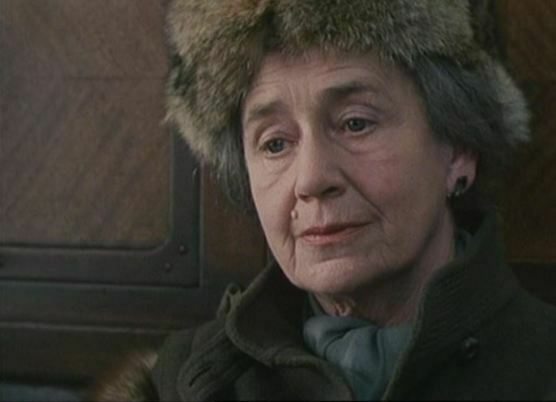
His greatest work, however, was Caught on Train, which is as much a director’s piece as it is a writer’s. It takes its tone from the above-mentioned Mike Westbrook score (Duffell was a keen jazz fan, and was presumably instrumental in signing up Westbrook), which both establishes a mood while creating a form of ironic commentary. The people, and the Europe, that we see, are travelling nowhere. There is some progress in this post-war world, but it is expressed in cold architecture, cold businessmen and a cold light. It tries to maintain some elements of the past, but the dream of gracious train travel from another age has been rudely replaced by the crowded train with seatless youngsters crammed into the corridors, much as Frau Messner points out that the restaurant car table is a plastic fake, not the true wood of the past. The train is a metaphor for a conflicted, paradoxical society, in which the illusion of privilege is crumbling, with its reservations, dining cards and first class travel, as the hordes amass, all too visible, biding their time.
The unease is in part a reflection of the political nervousness of the period. It is the time of the Baader-Meinhof gang, with jumpy police stopping trains to check for potential terrorists and finding Peter’s arrogance suspicious. Belgian youths on the train taunt Peter, then get into a bloody fight with broken bottles. Young rough sleepers huddle at night on Frankfurt station (“They are probably all from good families”, says Frau Messner). Peter’s assumptions are challenged further by the character of Lorraine (played by Wendy Raebeck), an American tourist to whom he is attracted but who offers a withering dismissal of Britain and Europe, from which she cannot wait to escape. Things are falling apart.
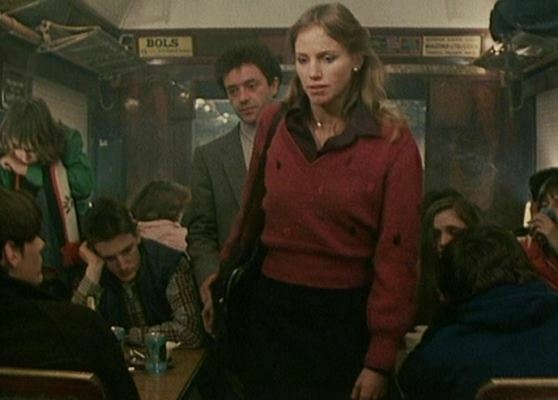
Yet the train keeps going. Caught on a Train follows the well-worn path of the journey narrative. The main characters find out more about themselves, or reveal more about themselves, as we progress. However, it is never so simplistic as to make a clear statement on the world, or Europe, or even an Englishman lost in Europe (Peter’s discomfiture looks all the more pointed in these days of Brexit). It sets a particular mood, not so much of unanswered questions as of answers to which the words have yet to be found. Where Peter will go at the end of his journey we cannot say. All we know is that Frau Messner and her world are leaving. They are, in the end, on different trains.
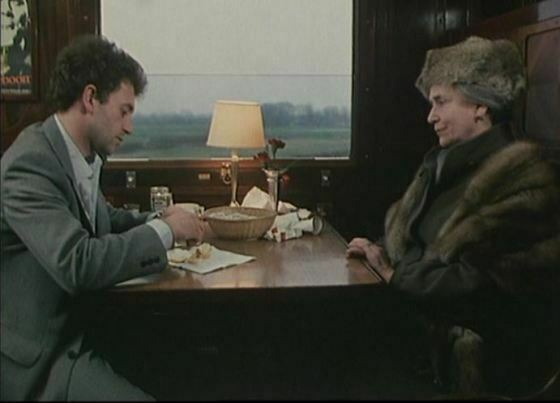
Thus, though this a work justly acclaimed for its dialogue, in which every word tells (heightened by two outstanding performances from actors relishing what has been offered to them), it is as much about things seen as heard. There are the claustrophobic train carriage settings, whose effect is accentuated by continual cross-cutting between Ashcroft and Kitchen – only at the end of the film do we have a shot of the two of them addressing one another face to face. The claustrophobia has filmic roots – there are resonances of The Lady Vanishes, the classic train across an uneasy Europe, but also Hitchcock’s The 39 Steps, with Kitchen’s persecution by the German police echoing Robert Donat’s experiences as Richard Hannay (Peggy Ashcroft, of course, starred in Hitchcock’s 1935 film).
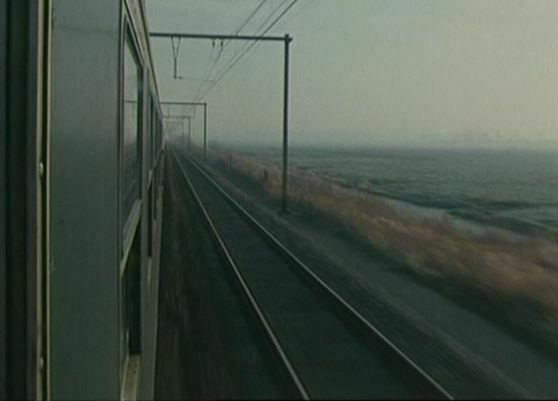
One only escapes this visual tension in the sequences at railway stations, or when the train is seen hurtling by through a landscape that could be anywhere, and where the sun never shines. Caught on a Train is a hymn to grey skies.
To bind all this together required filmmaking of great skill but effacing manner. A more heavy-handed, symbolic approach would not have worked at all. It would have had a deleterious effect on the dialogue. Peter Duffell, a director of quiet efficiency, understated intelligence and a particular affinity with his actors, was the ideal candidate. His great achievement was to create a work that transcended form. Caught on a Train sometimes gets called a television play, but it doesn’t look like television nor feel like a play. There is too much opening out for that. Yet it is not a film either – despite its look and metaphorical sense, it suggests more than the cinema prefers to show, while the final statements from Kitchen and Ashcroft, though memorable, have the patness of theatre about them. Caught on a Train could in fact work well as a radio play, with the punctuating images replaced by sounds. Or it could work, with just a few intertitles, as a silent movie, where everything we need to understand is there in the faces and the locations.
It is not a play, or a television programme, or a film. It is sui generis, the optimum expression of its subject, and that is the key to its greatness.
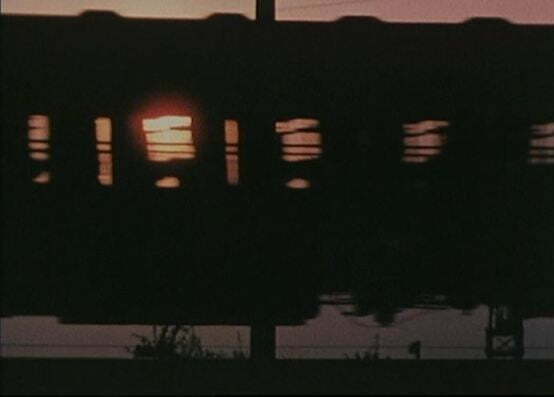
If you watch the featurette on the DVD of Caught on a Train, you will see a lot of Stephen Poliakoff being interviewed. You will not see Peter Duffell. He is not even mentioned. Nor are Tony Pierce-Roberts and John Else, the photographers whose images of poetic drabness so effectively establish the mood; nor Mike Westbrook, without whose deft score it is hard to imagine Caught on a Train at all (the score has never been released separately on CD, to the best of my knowledge).
Caught on a Train is a product of the genius of Stephen Poliakoff. But it was the late Peter Duffell who realised such inspiration on screen, who made the work exceptional, by thinking beyond the boundaries of form. Perhaps future screen histories and reference works could do a little more to recognise such artistry.
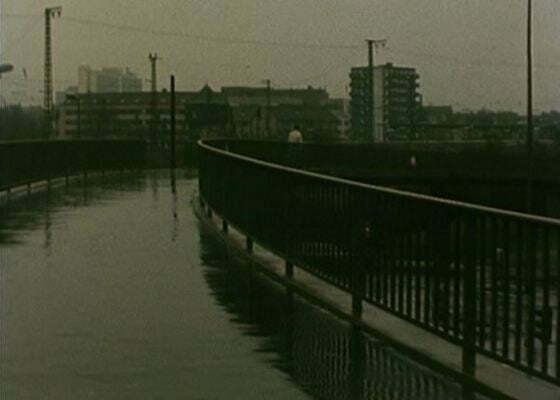
Links:
- Caught on a Train is available from the BBC as a single DVD or as part of a Stephen Poliakoff boxed set
- Ronald Bergan’s obituary for Peter Duffell in The Guardian is less than effusive, but it does at least call Caught on a Train “his film”
- Mike Westbrook’s website has a short sound clip from his score and links to obituaries, in a welcome tribute to Peter Duffell
Thank you for this. What an insightful review/analysis of this work. This is also one of my favourite TV plays, or as you say something quite unique that is perhaps best described as neither a play nor a film. I saw this as a child and it had a huge influence on me and has stayed with me. Like you I have revisited it a few times since. There is something very special about the play and how it profoundly captures the mood and atmosphere of the time. The music by Mike Westbrook is also very special (I wish the soundtrack could have been released). I like the way you have described the meanings, metaphors and symbols of the film which I think is spot on and very perceptive. You have articulated exactly why the film holds such a strong fascination and, as you say, transfixes the viewer.
Have you considered a review of Bloody Kids, another Poliakoff film from that era which I recall was quite powerful and controversial when it was released and has some parallels with this?
Thank you. I saw Caught on a Train when it was originally broadcast and was entranced from the first. Despite repeated viewings, it has not faded at all. I wrote the piece chiefly to acknowledge director Peter Duffell, a quiet talent who needed championing. I don’t do reviews, rather I write about things that mean something to me, which can include films. That said, I have to confess I’ve never seen Bloody Kids, so I must do so. Very soon.
Can’t find this again. Was once on YouTube, now disappeared. Absolutely wonderful.
I can’t wait to watch the DVD